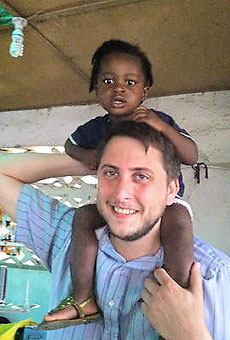

Inside Liberia: An AARC Member’s Experience
October 13, 2014
AARC member Michael Davis, BS, RRT, knew he was going into the Ebola hot zone last summer when he and a colleague traveled to the country on a medical mission, but that didn’t stop the RT at Virginia Commonwealth University in Richmond from making the trip. In fact, it was his sixth trip into the country with an organization called Trusted Angels Foundation, Liberia that he’s been working with since 2009.

Michael Davis also works with several orphanages during his trips to the country, providing them with basic health care services and much needed supplies.
He had to go
“I first became interested in volunteer work because my mentor, Dr. John Hunt, cofounder of Trusted Angels, went to Liberia and told me that I ‘had to go,’” says Davis. ”John knows me about as well as anyone and pushed me to do this—per usual, he was right!”
Davis worked with the group stateside for a couple of years, then made his first trip to the country in January of 2011. After witnessing the fragile nature of the medical system there firsthand, he decided the best way he could help was by fostering the development of the respiratory care profession in the country, and over the past three years he’s done just that.
“On my second trip, I met Joseph Moore, the only RRT in Liberia. We immediately became friends and have since worked to create a nationally recognized license for RTs with the Liberian Board of Medicine and Dentistry, opened a school of respiratory therapy—the Liberian Respiratory Health Care Institute—and created respiratory therapy departments at three hospitals,” says Davis. Moore is director of RT at one of them, the national hospital, JFK Hospital.

RT students in the Liberian program are now working at a clinic-turned-hospital to help fill the dire need for medical care in the country.
RT students rise to the occasion
Davis says one of the worst side effects of the Ebola crisis has been the destruction of the primary health care infrastructure in the country. “Although Ebola is terrible, the ‘normal’ killers in Liberia are still present—particularly malaria and typhoid. As Ebola has taken its toll directly, it has also done so indirectly by hindering access to care for other illnesses.”
Davis says students in the RT program wanted to do what they could to help and have now partnered with their clinical medical director, one of the top physicians in the nation, to help staff her clinic, which is doing its best to remain open.
“Her clinic is both an outpatient clinic and a small inpatient facility, roughly 20 beds, that is now functioning as a hospital,” explains Davis. ”The students are delivering respiratory care and assisting with primary care.”
While not an Ebola Treatment Unit (ETU), the RT students and their fellow clinicians there are still faced with the disease on a regular basis and must operate with full personal protective equipment (PPE) in order to triage any suspected Ebola cases for transfer to an ETU. One of the biggest problems they’re facing right now is a severe shortage of PPE. “They frequently run out of suits so that only one person can suit up at a time,” says Davis.
The country is in dire need of donations for everything right now, especially food and hygiene supplies, but donations of PPE would be especially appreciated by the clinic where the RT students are working.
“I am unbelievably proud of them,” says Davis of the students. “It hurts a lot to not be there working with them.”
He’ll be back
Now serving as president of Trusted Angels, Davis says his volunteer work in Liberia is “the most valuable and gratifying part of my life” and he plans to continue to help the nation as long as he is able to. In fact, he was supposed to go back to the country last week, but conditions there have deteriorated to the point where he would not have been able to do the work he was scheduled to do. “Much of the country is at a standstill,” he says. “Schools have been closed nationwide, many businesses are closed, travel is very difficult.”
Still, once things settle down and his work can resume, Michael Davis says he’ll be on his way. His next trip is already on the books for early next year.